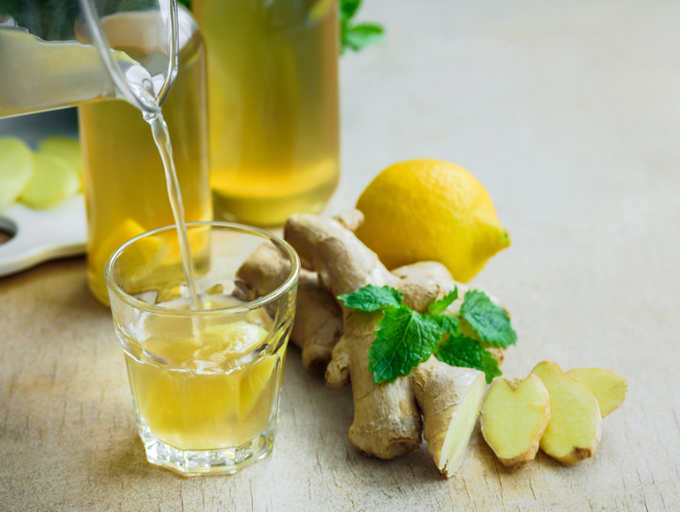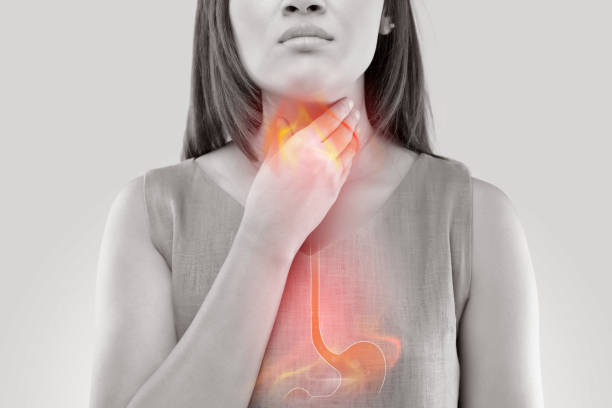Have you ever felt a painful burning sensation in your chest and throat, accompanied by the occasional regurgitation of an acidic liquid into your mouth? It is known as acid reflux. (1,2)
Reflux occurs when the stomach acid flows up the gut through the esophagus. At the base of the esophagus exists a ring of cartilage called the pyloric sphincter. (3)
The ring controls the opening and closing of the stomach, preventing its contents from moving back towards the esophagus.(4)
One in every five people is likely to experience reflux. It is uncomfortable and annoying. And if experienced frequently, it may result to worse conditions like ulcers and even cancer.
Many spend much on medications to treat reflux, but they don’t realize that you can quickly treat this at home. Moreover, if there is something you should learn to avoid is over the counter drugs.
Here are some 19 easy and effective home remedies for acid reflux.
1. Avoid overeating
A cording to a clinical study done in 2020, gastroesophageal reflux primarily results from overeating.
When you take more food than your stomach can hold, the sphincter tends to weaken. It, therefore, relaxes uncontrollably, allowing stomach acid and some half-digested food to move back into the esophagus.
The sphincter is only meant to relax open when you swallow, vomit or belch. However, excess food may force it to open.
Excess food in the stomach may also squeeze and push the stomach acid past the sphincter-even without it opening. (5)
When your acid reflux symptoms begin after meals, you need to check the quantity you uptake. Avoiding excess food can be a perfect way to help solve acid reflux.
2. Lose weight
According to a 2010 medically reviewed study, obesity increases the chances of experiencing acid reflux.
Usually, the diaphragm helps support and strengthen the sphincter. But when you get excess fats in the belly, they may build up so much pressure onto your esophagus that it loosens and opens up unusually, allowing the stomach acid to move up the food pipe. (6)
Sometimes, the pressure may push the sphincter up above the support of the diaphragm. When this happens, the sphincter becomes weaker and more susceptible to pressure from the stomach. (7)
A study by Milunovich (2014) confirms that extra weight, especially in the belly area, increases the risk of acid reflux.
So if you realize that you experience acid reflux more frequently as you gain weight, then cutting down the weight is the best remedy for acid reflux.
3. Regulate your carbohydrate intake
There is increasing anecdotal evidence to support the claims that reducing carbohydrate consumption reduces your risk of getting reflux. However, a 2016 research proves that carbohydrates may increase the risk of GERD in women suffering from obesity.
Like sugar, other undigested carbohydrates may support the overgrowth of certain bacteria and fungi in the stomach. Overgrown bacteria build up extra pressure in the abdomen.
Bhardwaj and Kishore (2021) suggests that this is one of the most common reasons for recurring acid reflux experiences.
Impaired carbohydrate digestion and absorption even worsen the condition. One with a bacteria overgrowth is likely to develop more digestion problems, leading to more reflux.
4. Avoid or Reduce Alcohol Intake
A 2019 meta-analysis study found that there is a strong association between alcohol intake and the risk of acid reflux.
Everyone who drinks can confirm that the acid reflux experienced after drinking is worse than the ones experienced before. Alcohol indeed increases the likelihood and severity of the acid reflux.
Alcohol increases stomach acid. When the acid is increased, it moves to the sphincter impairing its functioning. Alcohol also stains the esophagus, making it unable to clear itself of acid. This condition results in acid reflux. (8,9)
You are advised to avoid taking alcohol if you are experiencing heartburns frequently. You are also supposed to avoid taking alcohol shortly before or after meals.
Taking alcohol before digestion begins and when it is in the process increases the chances of getting acid reflux.
5. Reduce the coffee you consume
Just like caffeine, coffee weakens the lower esophageal sphincter, its among the disease causing factors in human.
In an experiment done by Alam (2019) two groups of people were given either caffeine dissolved in water and coffee. They found that coffee significantly increased the risk of acid reflux than caffeine.
Although the reasons are not scientifically proven, it is evident that coffee is likely to run you into a risk of getting heartburn. Furthermore, a 2019 study shows that coffee may be responsible in acid reflux to a given group of people
Coffee consumption increases the duration of acid reflux. It may also cause damage to the esophagus. The severity of the effects of coffee, however, vary between individuals. It is, therefore, necessary to be keen on your body’s reactions.
If your acid reflux comes after taking coffee, then it is the thing you need to avoid the most.
6. Avoid raw onions
A 2015 study suggests that onions increases the episodes of reflux and esophageal acid exposure. Compared to meals without raw onions, meals with raw onions significantly increased acid reflux and heartburn.
Onions contain high quantities of fermentable fiber. The fiber begins to ferment as soon as it gets to the stomach, leading to more acid and gas production. This gas causes belching, and the acid produces increased chances of acid reflux. (10)
Moreover, when belching, the sphincter opens allowing acid to move back to the esophagus. Onions also irritate the esophagus hence worsening the condition. If you have to take raw onions, make it occasional. But if you can avoid it, the batter.
7. Avoid carbonated beverages

Most soft drinks are preserved using carbon dioxide gas. This gas is not suitable for a person with acid reflux. (11)
A study by Bella (2012) confirms that carbonated soft drinks are closely linked to increased acid reflux. He added that they are likely to escalate the symptoms of acid reflux.
The primary reason carbonated drinks increase acid reflux is the carbon content in them. It is likely to increase belching making the sphincter open more frequently. When this valve opens more regularly, it allows the passage of stomach acid back into the esophagus.
Frequent belching can also weaken the valve allowing the stomach acid to move back into the esophagus. So if you are prone to experiencing acid reflux, carbonated drinks should be the last thing you want to take.
8. Avoid citrus juice
Lambert in 2018 conducted a study on 400 patients with acid reflux. He found that orange and grapefruit worsened the acid reflux in 73% of them. The typical substance in both fruits is citric acid.
The reason citric is the primary culprit, in this case, was because even orange with a neutral pH aggravated the symptoms of acid reflux.
Although citrus cannot weaken the lower esophageal sphincter, it likely has components that irritate the valve and the esophageal lining, making it loosen uncontrollably.
Citrus do not cause acid reflux but may worsen an already existing condition. Therefore, avoiding citrus and citrus-containing juices is an effective home remedy for heartburn, especially for people with existing issues.
9. Avoid artificial processed mint
Peppermint, spearmint and most other mints are famous herbal medicines but not for acid reflux.
In a controlled study by Eissa et al. 2021, they found peppermint to be a significant factor aggravating the symptoms of reflux.
Mint is thought to worsen acidity by irritating the gut and the lower esophageal sphincter. So if you have reflux, peppermint and any other mint should be on your list of what not to take.
10. Elevate your head
For obvious reasons, putting the upper part of your body in a lower position than your stomach could worsen acid reflux.
When your body is inclined with the head lower, the stomach content will pressure the sphincter into the opening. This may make it loose after tiring from the pressure.
Some acid may also drip through the sphincter when your head is in a lower position than your stomach.
Therefore, sleeping in this kind of posture is one of the things to avoid when experiencing acid reflux.
Always maintain your head elevated above the other parts of your body. Raising your head makes your stomach content settle in its lower parts; this makes it easier for the valve to close and retain the stomach acid in the stomach.
11. Avoid eating three hours before going to sleep.
Eating at the right time and amount is one of the healthy practices that form part of the 8 laws of health.
Chung, Habib, and Ouyang (2020) observed that eating when nearing bedtime multiplied the symptoms of acid reflux.
Although there is no scientific explanation for this phenomenon, many confessions agree that eating late at night worsens acid reflux.
It is thought that this habit complicates the digestion process. Since digestion stops immediately you fall asleep, the stomach may produce excess acid. This may build up pressure, forcing it up through the sphincter.
More research is recommended on this remedy to establish the relationship between acid reflux and eating late at night.
However, this is still a good health practice that may help you with other conditions. So when you have reflux, it is essential to check your supper time.
12. Sleep on your left side

Anatomy justifies this home remedy for reflux. The gut joins with the stomach on the right side. That means the sphincter is located on your right side.
By sleeping on your left side, you keep this valve above the stomach. This posture makes it easier to close and control the movement of stomach acid.
Sleeping on your right side is discouraged because it places the lower esophageal sphincter below the rest of the stomach. This posture builds up pressure that may make it loosen. Moreover, it is easier for the stomach acid to drip past the valve in this position.
This sleeping posture is the most recommended to help reduce acid reflux. Even for people without reflux, sleeping on your left helps prevent you from developing this condition.
13. Gingerroot

Ginger is well known for its anecdotal benefits to many stomachs and digestive illnesses. It is also equally effective in reducing acid reflux.
Its effectiveness is backed by claims that it helps reduce acid production in the stomach. By decreasing the acid produced, significantly reduce the severity and likelihood of acid reflux. It also has excellent anti-inflammatory and digestive properties that make it effective in combating acid reflux.
Therefore chewing a little gingerroot could be an excellent way to help with your reflux. However, this has not been well researched and should be used in moderation.
14. Aloe Vera juice
Apart from helping with sunburn and other multiple illnesses, aloe vera juice is an effective home remedy for heartburn.
There is much anecdotal evidence that aloe vera juice dramatically helps reduce the symptoms of acid reflux.
Aloe vera helps protect the digestive tract. By protecting the gut, it maintains the production of acid at desired levels.
Just the required levels of stomach acid are a great way to prevent reflux. Therefore, you can consider drinking some aloe vera juice to help you curb this condition.
15. Apple cider vinegar
Apple cider vinegar provides excellent relief from gastroesophageal reflux. Sipping a little apple cider vinegar can relieve you of the burning sensation almost instantly.
Although it is an acidic substance itself, there is considerable anecdotal evidence backing up the claims.
Koufman, and associates in 2015, researched to compare the effectiveness of this remedy against some medical prescriptions. They discovered that this remedy was as effective as the other prescriptions under the test.
You can try this remedy but take caution, for it does not work for everyone the same way.
16. Eating alkaline and fiber-rich foods.
Fiber-rich foods make you feel full quickly hence helping reduce your meals. By reducing the quantity of food you take, you significantly reduce the risk of getting acid reflux.
On the other hand, Alkaline foods help neutralize the acid in your gut, making the effects less severe. Taking alkaline foods is a good remedy for heartburn that has begun.
Fiber-rich foods, however, should be incorporated into the meals to prevent acid reflux. High-fiber foods that are effective in healing reflux include carrots, green vegetables, sweet potatoes, beets, and oatmeal.
Alkaline foods like bananas, cauliflower, melons, fennel, and nuts can help offset the symptoms of acid reflux.
17. Watery foods
Water gets to the stomach and dilutes the acid. Eating such foods help with acid reflux since the water in them gets incorporated into indigestion.
Watery foods are an excellent home remedy for reflux. Lettuce, cucumber, watermelon, and celery have proven effective in relieving acid reflux symptoms.
18. Coconut water
Coconut water helps bring significant relief from acid reflux. It is rich in fiber that helps soothe your esophagus and digestive tract. It also helps regulate acid production in the stomach.
The water in it is also helpful in diluting the stomach acid, making it less severe on the body. So if you have some acid reflux, drinking half a cup of coconut water is a good idea.
19. Jaggery
Jaggery is an effective home remedy for acid reflux. It greatly helps in digestion, boosting your stomach activity. It helps regulate the quantity of digestive juices produced by the stomach, including stomach acid.
When taken, people have often reported a soothing, cooling effect. This effect is essential for those with gastroesophageal reflux. Sucking a piece of jaggery after every meal can help you from heartburn.
Wrap up
Although it is a common health problem, acid reflux is still annoying and boring. You may look around every time without really finding a solution.
Moreover, sometimes you may take medications without feeling permanent relief. The only remedy that guarantees a solution with no side effects is the home remedies.
Home remedies help reduce the symptoms of acid reflux and also prevent them from re-occurring. If you have an acid reflux problem, the twenty options are just perfect for you. Try them and reap the benefits.


Pingback: 7 Home Remedies for Insomnia | GILEAD THERAPY
Pingback: Home remedies for excessive gas | GILEAD THERAPY
Pingback: 17 Home remedies for bloating | GILEAD THERAPY
Pingback: 13 Effective Home Remedies for Nausea | GILEAD THERAPY
Pingback: Heartburn home remedies | GILEAD THERAPY
Pingback: 16 Natural home remedies for stomach ulcers | GILEAD THERAPY
Pingback: 22 effective home remedies for dry cough | GILEAD THERAPY
Pingback: 17 Acidity home remedies to try today | GILEAD THERAPY
Pingback: 13 Home remedies for indigestion-a review | GILEAD THERAPY
Pingback: 17 alkaline foods that reduce acidity in the body | GILEAD THERAPY
Pingback: 17 Painful Period Cramps Home Remedies | GILEAD THERAPY